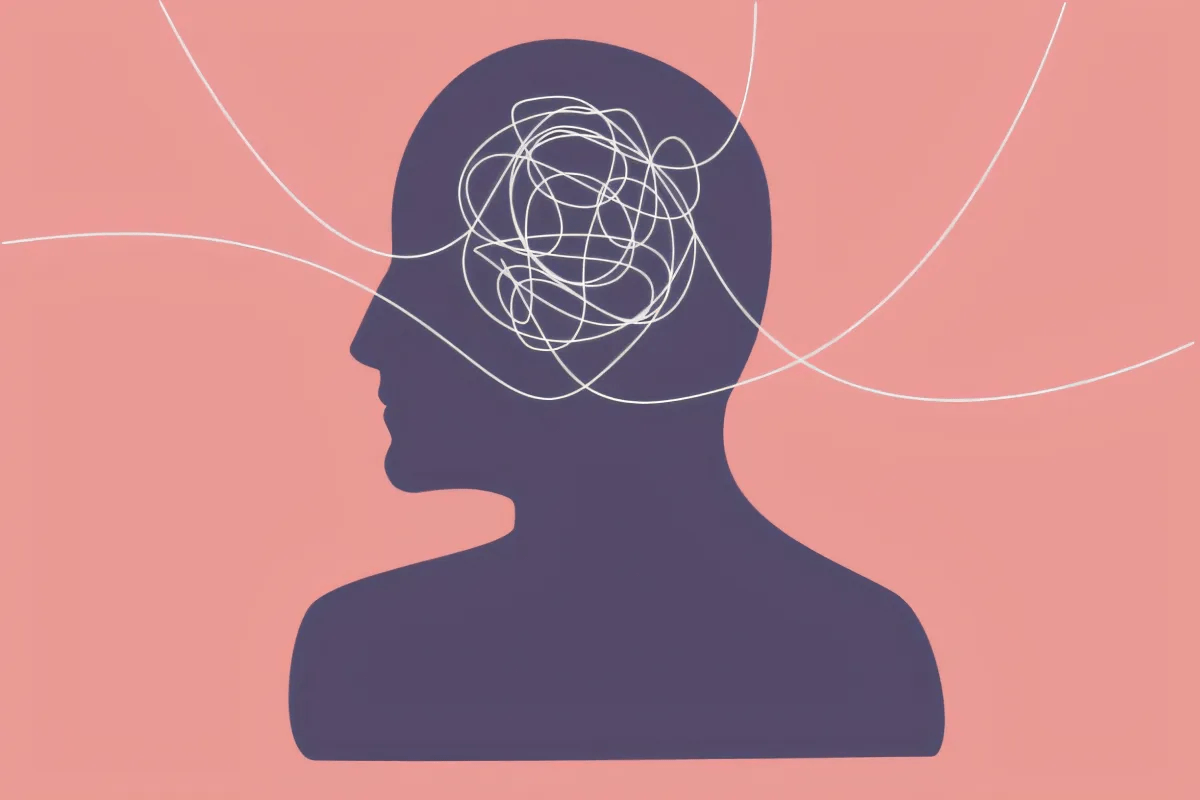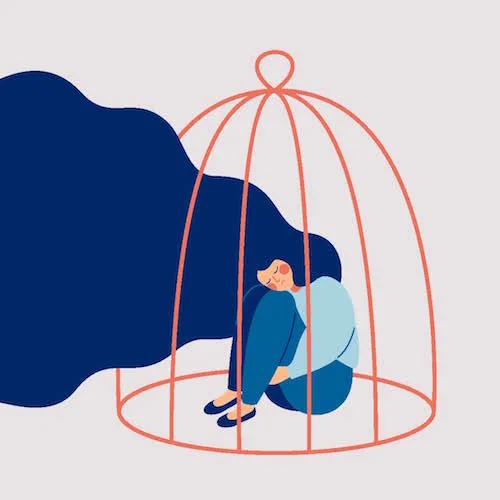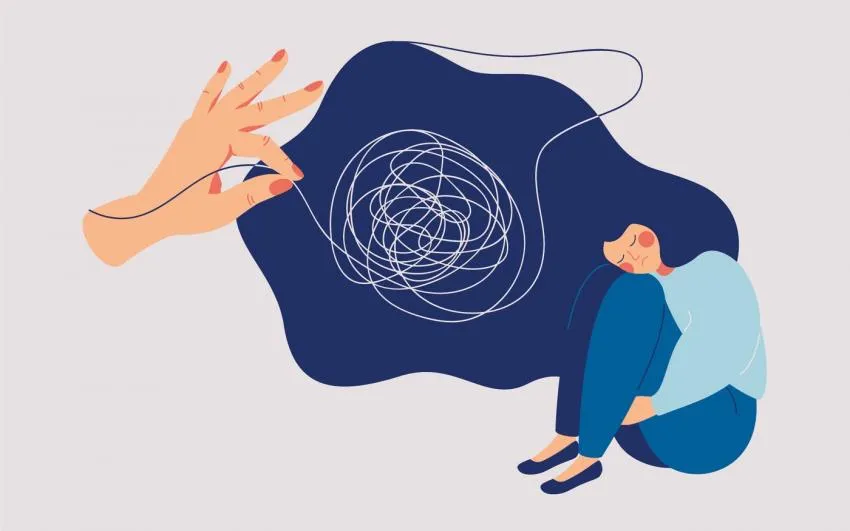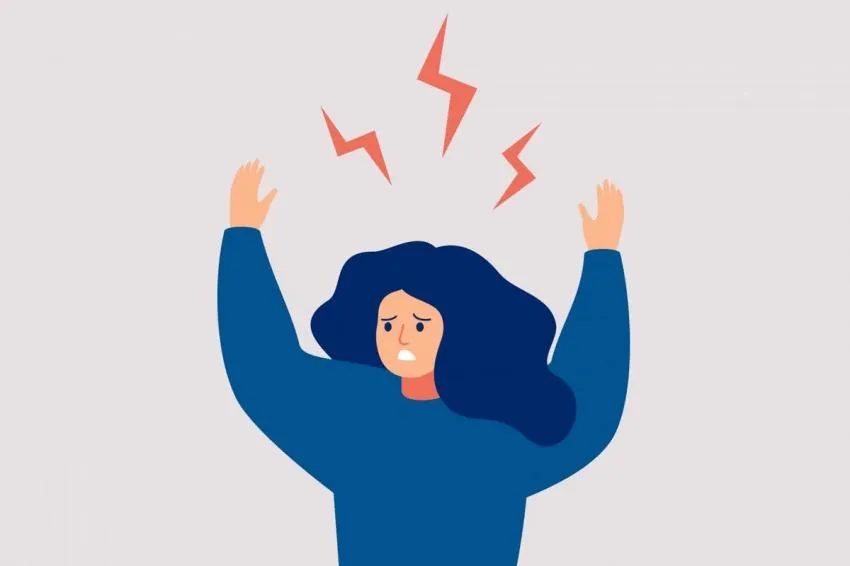How To Know: Are You Living With OCD?
If the title of this article has captured your attention, I would imagine that you are feeling afraid:
Afraid of the thoughts that affix themselves to your identity, your values, your surroundings – beating pulses of panic and uncertainty that tether themselves to you.
Afraid of what might happen if you were to lose control - if you were ever unable to resist or comply with your thoughts, or the conditions they enforce.
Afraid of yourself: Of what you might be capable of doing. Of what might happen if you were placed in certain environments or around certain people.
If the above descriptions resonate with your experience, then you may be living with Obsessive-Compulsive Disorder.

What is Obsessive-Compulsive Disorder (OCD)?
OCD is a mental health disorder that affects 12 of every 1,000 people living in Britain today. Obsessive-Compulsive Disorder is characterised by experiencing cycles of unwanted, intrusive thoughts, images, or urges that trigger feelings of distress in sufferers.
To resolve these feelings, sufferers can engage in compulsions – behaviours that are practiced to reduce distress or eliminate obsessions. These behaviours may manifest physically or involve mental practices such as repetition, checking, and ruminating on the subject of one’s obsession.
Crucial to understanding this disorder is a knowledge of how obsessions develop and the motivations that fuel compulsive behaviour.
For a number of people with OCD, the following is true: Sufferers have an inflated sense of responsibility, a tendency to overestimate threat, and personal aggravators that feed their disorder.
How do these characteristics exhibit in a person with OCD?

Having an inflated sense of responsibility means that an individual assigns the duty of preventing harm to themselves, rather than distributing that responsibility between themselves and others.
As the OCD sufferer is disposed to assume responsibility, this perceptual approach determines their response to fear-provoking thoughts. The individual with OCD believes it is their responsibility to diffuse the threat posed by fear-inducing thoughts, which fuels the development of compulsions.
This is because compulsions are developed to contain and minimise the threat posed by a sufferer’s thoughts – threat that the individual fears manifesting in the physical world if they fail to control it.
This psychological characteristic is associated with another phenomenon in OCD known as ‘thought-action fusion’. Thought-action fusion is a meta-belief that equates thoughts to physical actions.
In OCD, thought-action fusion looks like believing a feared outcome may result from a thought associated with an obsessional theme.
For example, I may fear that I have the desire to harm a family member from having an involuntary thought of doing so, even if this thought causes me alarm and distress. This causes the OCD sufferer to attribute the same level of meaning and threat to their intrusive thoughts as they would to, for example, planning to intentionally harm a family member in their vicinity.

OCD Characteristics and the Salkovskis Model
Thought-action fusion ties into the tendency for OCD sufferers to overestimate threat.
Clinical psychologist, Paul M. Salkovskis, attributes this characteristic to his ‘A-B-C’ model of cognitive therapy. Through his research into Obsessive Compulsive Disorder, Salkovskis formulated a model of thinking that he believes sufferers of the disorder unconsciously conform to.
The first component of Salkovskis’ model, stage ‘A’, involves experiencing an intrusive thought. The Cognitive Behavioural discipline stresses that cognitive events (thoughts) are random and spontaneous, meaning that the sufferer is indisposed to exercise control over this stage.
The second component, stage ‘B’, is where Salkovskis believes the OCD sufferer’s interventions begin. For Salkovskis, stage ‘B’ is all about interpretation and attributing meaning.
Whilst those without OCD may experience intrusive thoughts and move on without questioning their meaning, the individual with OCD is compelled by their overdeveloped sense of responsibility to question the thought.
For example, a common intrusive thought people have is of pushing a member of the public into oncoming traffic. Whether we are waiting at the train station or loitering at the bus shelter, we have all wondered what would happen if we were to push the person hovering at the curb into the road.
According to Salkovskis, this experience would give an OCD sufferer the urge to contextualise their thought – to make their thought ‘fit’ into their understanding of who they are, what they value, and what they are capable of.
It is this process that leads the OCD sufferer to stage ‘C’ – consequences. During this cognitive stage, Salkovskis believes that the individual with OCD faces the implications of trying to make an intrusive thought, urge or image fit into their understanding of themselves.
What makes intrusive experiences so frightening for OCD sufferers is that they are ego-dystonic, meaning that they oppose their self-image and values. This means that intrusive experiences can alienate OCD sufferers from their sense of self and cause them to reconceptualise themselves as threats to others.
Each of Salkovskis’ stages illustrates how the thought patterns that characterise OCD cause sufferers to sense a threat from experiences that, whilst strange and unpleasant to go through, do not represent the potential for harm to occur.

OCD and Personal Aggravators
The last defining characteristic of OCD I’ll be exploring is the personal aggravator:
A personal aggravator is a theme that triggers a fear-based response in a person.
Whilst we all have things that disturb, scare, and repulse us – people with OCD have an elevated response to phenomena of this nature. This is because OCD sufferers tend to view things of this nature as possibilities, rather than contingencies dependent on unlikely factors aligning.
For example, an individual with OCD may have an obsessional fear of cheating on their partner. This could mean that anything from media portraying cheating, conversations discussing extra-relational attraction to meeting a friend’s partner for the first time may aggravate the sufferer’s obsession.
This can plunge the sufferer into feelings of guilt, shame, and self-doubt – prompting them to perform compulsions for relief or avoid coming into contact with content, situations, and people that ‘aggravate’ this theme for them.
Early-Life Development and Personal Aggravators
According to Aaron Beck’s Developmental Theory, an OCD sufferer’s personal aggravators can have their roots in early-life experiences.
It is Beck’s view that what we experience during our formative years can create cognitive templates - through which, we continue to perceive the world as we grow.
An example of this could be a child that is consistently told they cannot be relied on to behave properly. The reinforcement of this message through the child’s formative years, from the perspective of Developmental Theory, can embed the belief that they are not a dependable or trustworthy person.
This core belief can then go on to influence the strategies the individual uses to mitigate threat as it arises in later life.
Such an individual may, for example, enter into a romantic relationship believing that they cannot be relied upon and may disappoint their partner’s expectations or abuse their partner’s boundaries.
If this individual develops OCD in conjunction with this core belief, it is Beck’s view that being placed in situations that appear threatening to the individual may activate these beliefs. This may then trigger compulsive responses that attempt to reduce the likelihood of outcomes associated with this undependable predisposition.

If you recognise any of the above cycles or thought patterns in your own thinking and behaviour, you may be living with Obsessive-Compulsive Disorder.
Whilst there is more to learn about OCD, such as the thematic subtypes that emerge between sufferers and the support and treatment that can be accessed, identifying your experience amongst the phenomena described indicates that you may be dealing with Obsessive-Compulsive Disorder.
Remember, the foundations of recovery are awareness and information. The illusion of control OCD perpetuates will keep you tethered to draining compulsions, whilst taking command of this disorder’s influence on your life will set you free:
Empower yourself to stop living under this disorder and begin living with it, today.
Never let fear decide your future.
Opinions and Perspectives
This helps explain why reassurance seeking never really provides lasting relief.
The connection between responsibility and compulsions really illuminates why we feel compelled to act.
I appreciate how it explains OCD as a medical condition rather than a personal failing.
The article perfectly captures the exhausting cycle of thoughts and compulsions.
This gives me a framework to better understand and explain my experiences to others.
The description of personal aggravators helped me identify my own triggers better.
I'm grateful for articles like this that help educate both sufferers and their loved ones.
Learning about thought-action fusion was a turning point in my understanding of my condition.
The explanation of how OCD develops really helps remove some of the self-blame.
It would be helpful to have more information about coping strategies and treatment options.
The distinction between living under versus living with OCD is really important.
Understanding the mechanism behind OCD helps reduce some of its power over me.
I appreciate how it emphasizes that recovery is possible without promising an easy solution.
The article could have mentioned more about how OCD impacts decision-making in everyday life.
Yes, stress definitely amplifies my symptoms. It's like everything becomes more intense.
Does anyone else find their OCD symptoms get worse during specific times or situations?
It's complex how OCD can make us question our character when it's actually showing what we value most.
The emphasis on awareness and information as foundations for recovery really resonates with me.
I notice my themes change over time, but the underlying patterns described here remain the same.
This article gives me hope that understanding OCD is the first step to managing it better.
Has anyone tried applying the A-B-C model in their daily life? I'm curious about practical applications.
It's fascinating how OCD can latch onto our deepest values and use them against us.
Reading about thought-action fusion helped me understand why I get so scared of my thoughts.
The explanation of compulsions as coping mechanisms rather than character flaws is really important.
Actually, I think articles like this help people recognize when they need professional help.
Sometimes I worry articles like this might make people self-diagnose incorrectly.
The section about early-life experiences really made me reflect on my own upbringing.
I'm curious about how different cultures interpret and treat OCD. Anyone have experience with this?
This reminds me that I need to be more patient with myself during recovery. It's a process, not a quick fix.
The way they explain cognitive events as random and spontaneous is really freeing. We're not responsible for having these thoughts.
I find it helpful to understand the theoretical framework behind OCD. It makes the experience feel less random and chaotic.
The article could have mentioned more about how OCD affects relationships and daily functioning.
Yes, it took me years to get diagnosed because I didn't fit the stereotypical image of OCD.
Anyone else find it frustrating how long it can take to get proper diagnosis and treatment for OCD?
The description of thought patterns is spot on. It's like the article is reading my mind.
I appreciate how the article explains OCD without stigmatizing it or making sufferers feel ashamed.
This makes me realize how exhausting it must be to live with OCD. The constant mental gymnastics sound overwhelming.
The concept of personal aggravators is interesting. I can definitely identify specific themes that set off my anxiety.
I'm surprised by how accurately this describes my daily mental processes. I've never seen it explained so clearly before.
This really highlights how OCD is about more than just behaviors. The thought patterns and beliefs are at the core.
The explanation of compulsions as attempts to reduce distress makes so much sense. I always thought I was just being irrational.
I wonder if the statistics have changed since this was written. Mental health awareness has increased so much lately.
The concluding message about living with rather than under OCD is powerful. It feels more achievable than trying to eliminate it completely.
It's interesting how OCD can make us doubt our most fundamental values and beliefs about ourselves.
The part about avoiding triggers resonates with me. I've structured my whole life around avoiding certain situations.
I wish I had read something like this years ago. It would have saved me so much self-doubt and confusion.
You make a fair point about other types of OCD, but I think the principles discussed here apply broadly to most forms of the disorder.
The article seems to focus a lot on harm-related OCD. There are many other types that deserve attention too.
I found the connection between responsibility and compulsions particularly enlightening. It explains why I feel compelled to act on my thoughts.
The train station example perfectly describes what I go through. It's such a relief to know others experience these thoughts too.
This really helped me understand my partner's struggles better. Thank you for sharing such an informative article.
Never realized how much OCD involves an overestimation of threat. I always thought I was just being cautious.
I appreciate how this explains the difference between having random thoughts and having OCD. It's not just about having the thoughts, it's about how we interpret them.
The article could have gone into more detail about treatment options. That feels like a crucial missing piece.
Reading this makes me wonder how many people I know might be silently struggling with OCD without anyone realizing it.
The description of ego-dystonic thoughts really helped me understand why these thoughts feel so alien and distressing.
Actually, I think Beck's theory has merit. My own experiences align pretty closely with what he describes about cognitive templates forming early in life.
I disagree with Beck's developmental theory. Not everyone with OCD had difficult childhoods or received negative messages growing up.
The personal aggravators section makes so much sense. I notice certain themes definitely trigger my anxiety more than others.
It's actually quite comforting to know these intrusive thoughts are normal. I've been carrying this shame around for so long thinking I was the only one.
Does anyone else find it interesting that 12 in 1000 people in Britain have OCD? That seems higher than I would have expected.
The section about inflated responsibility hits close to home. I'm always taking on the burden of preventing bad things from happening, even when it's clearly not in my control.
I find Salkovskis' A-B-C model fascinating. It explains why some people can brush off random thoughts while others get caught in these debilitating cycles.
The part about thought-action fusion particularly resonates with me. I've struggled with intrusive thoughts for years and always felt like a terrible person because of them.
This article really opened my eyes about OCD. I always thought it was just about being super organized or cleaning obsessively, but now I understand it's so much more complex than that.
